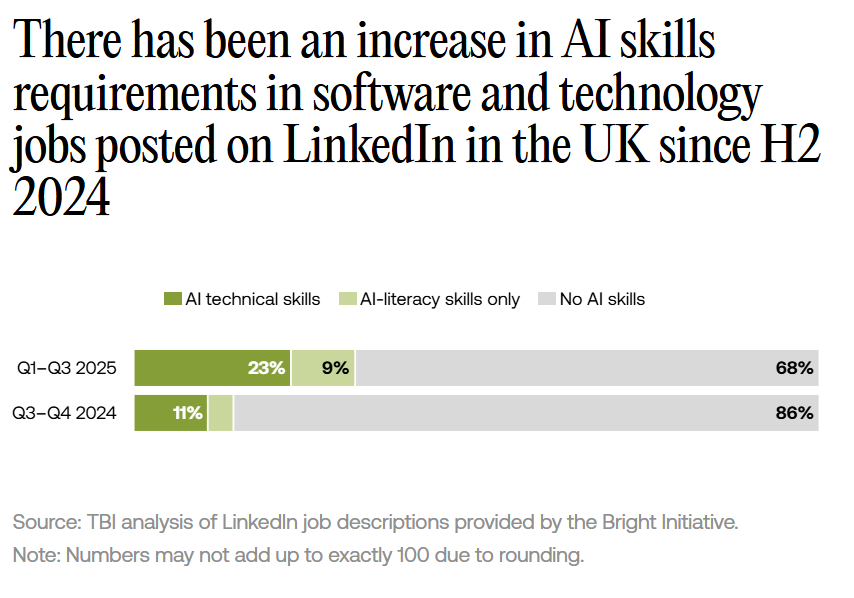About
The Tony Blair Institute (TBI) for Global Change is a UK-based not-for-profit, non-partisan organization that works to help governments and leaders transform bold ideas into reality. TBI’s vision is to create more open, inclusive, and prosperous countries for all and they achieve this by advising on strategy, policy, and delivery across governments and party lines. Their data and policy teams, with experts from a variety of fields, work to research and address critical challenges across areas such as education, economic prosperity, technology, and more.
Challenge
AI tools have become pervasively used in work and life, yet the English educational system struggles to adapt their curriculum and equip students with the skills they need to succeed in a fast-changing world. The stakes are high: economic resilience, national competitiveness, and social mobility all hinge on a coherent response.
For instance, there is an increasing demand for AI-literacy within non-technical roles. TBI’s analysis of LinkedIn data provided by The Bright Initiative by Bright Data, there has been a 69% increase in demand for AI-literacy skills in professional occupations since the latter half of 2024. Yet today, a substantial AI literacy gap persists. Only 20% of state secondary teachers reporting pupils are instructed how to use AI in their schools and just 10% report incorporating AI into subject teaching.
Key enablers of this change, like teacher training and infrastructure, are also missing: 43% of teachers rate their confidence with using AI at just three out of ten, and only 68% of schools have dependable WiFi. Furthermore, 34% of parents report that their child lacks continuous access to a device at home for online schoolwork.

The challenge of preparing young people for a world being reshaped by AI is intensified by an AI-Technical-Skills Gap; LinkedIn data, provided by The Bright Initiative, shows AI skills requirements in software and technology jobs have more than doubled between the second half of 2024 and the first half of 2025. This underscores the critical need for comprehensive reforms to prepare students for an AI-driven future.
Impact
The report recommends significant improvements in educational infrastructure to ensure pupils’ AI readiness in England. Key recommendations include:
- Embed foundational AI literacy in the primary school curriculum from Key Stage 2 (for pupils over the age of 7), and introduce a stand-alone, age-appropriate AI-literacy module for all pupils entering secondary school (at age 12).
- Reform GCSE Computer Science (the key route to AI technical roles in the English education system) to emphasise practical application, incorporating machine learning, ethics and project-based assessments such as building chatbots or analysing datasets.)
- Dramatically scale up investment in digital infrastructure, ensuring high-speed broadband and resilient WiFi in all schools, and equip schools with the technical capacity required to manage devices and connectivity.
In the coming weeks this research will be used to inform content of sessions about AI readiness in the British education system ahead of the release of national reviews on education.
Read the full report: Building the Foundations for AI-Proficient Education in England’s Schools

